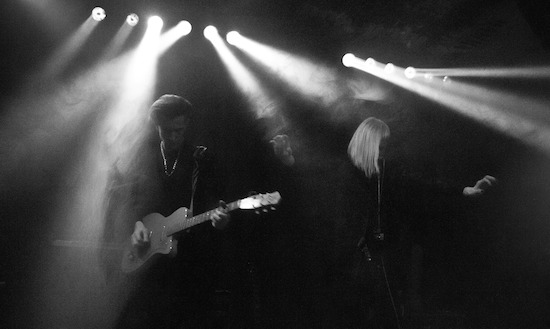Something dark lurks in the deepest recesses of East London, something that shuns daylight and convention and seemingly keeps human contact at bay. It’s something divinely decadent and mired in a glamorous and pansexual sleaze. And that something is S.A.D.. Formed by DJ and producer Sebastien Bartz and musician Alex Wolf, the duo claim that their project is a reaction to the "archaic sounding bands and pretentious leftovers from the indie scene", and if that in itself isn’t enough to pique interest, then the fact that they revel in a demi-monde of darkly deviant delights where the lines of pleasure and pain are not so much blurred as totally rubbed out, should.
Their sound, an unholy fusion of black matter and insistently pulsing electronic beats topped off with a fetishistic fashion sensibility is accompanied by a manifesto that reads like a declaration of war: "We are not your favourite TV show, we are not your favourite poster," they intone. "We will not substitute your lack of self worth, or inherit you with any sense of individualisation. We are not here to be added to your list of ones to watch. We are not a band. We are a militant organisation and you are our target. We have buried you in a hole and we are armed with stones. We are not another number in your system. We are your enemy, offended by your stupidity. We will fight until we win. We hate you. We are S.A.D."
Indeed, S.A.D. are so seething with fury and rage as they prepare to release their single, ‘She’s Gone’, that they refuse to meet the Quietus in person, instead choosing only to communicate via e-mail.
How and why did S.A.D come together?
S.A.D.: We met while DJing techno together around East London. We were talking about how there is an absence of good guitar music and how everything surrounding how bands are represented was becoming plastic.
S.A.D have issued a manifesto. Is this a means of liberation or is there a danger of painting yourself into a corner?
S.A.D.: The manifesto is based on escapism, a need to escape from a world of vapid platitudes and niceties, thinly veiled by a collective drive to succeed. Our manifesto is a rejection of all inconsequential, self-righteous notions of freedom.
Your manifesto states that you are a "militant organisation". How does this manifest itself in practical terms?
S.A.D.: Our tone of militancy is a satire on self-worth, masculinity and the constant drive for purpose in a world filled up with abstraction and arbitrariness. This manifests in practical terms through our aesthetic. The way we look and present ourselves is a rejection of purpose, and centred on the accumulation of objective worth.
What role does fashion play in your music?
S.A.D.: We wear nice clothes and play good songs. In the past we have worked with fashion designers on soundtracks for their movies and catwalk shows. We keep fashion close to our hearts, and are always seeking new ways to express ourselves.
You played your debut show at celebrated fetish club The Torture Club. To what degree does BDSM inform your output and your lives?
S.A.D.: We are inspired by militant aesthetics and the discipline involved in BDSM sessions. For at least the last five years the music scene has seemed recycled, like the same samples are being used over and over again. We are opposed to that trend and aim to create a new space. We reject passivity, we are not trying to homogenise ourselves into something easily digestible. We believe that this parallels living in a world that is on the edge of consistent global conflict.
Do you view S.A.D as an end in itself or a means to a wider objective?
S.A.D.: The notions of a "wider objective" are found within our drive to create a movement with relevance. We want to bring substance back to sound, in a scene that has become a basic 1:1 generic copy and paste culture. We also aim to scrutinise all notions of masculine authority in a patriarchal society through our own visual representation.
Where is your natural environment? Is it the studio, the stage or somewhere else altogether?
S.A.D.: We don’t have a collective natural environment, Sebastian will be found in the studio, working on one of his multiple projects and pushing the envelope as it is. Alex will usually be hidden behind a book, or writing something. We could both be described as isolationists who have eschewed social convention for other worldly pursuits, namely making music and educating oneself.
You’ve stated elsewhere that "life is dark”. Does anything make you smile?
S.A.D.: Playing with modular synths and analog sequencers make us smile. It doesn’t matter if you stop breathing, the machine will carry on. We enjoy the concept of the fleshed dying, yet the continuation of the machine. This sentiment we feel comes across in our music.
You’re fond of cold and non-human elements in music. What do you find disappointing in humanity?
S.A.D.: By non-human elements we mean an involvement of machines, and automatisation of the music making process. No matter what genre of music everything is on the grid.
What’s your ultimate ambition for S.A.D?
S.A.D.: To help create a super intelligent AI in order to not be punished by that AI (which may already be in existence, creating our reality as a simulation). I mean, it’s Roko’s basilisk. We believe that if we help the AI, it might make us famous or bless us with eternal life.
‘She’s Gone’ is out now


